Bananas for Weight Loss: Benefits, Timing, and Glucose Facts

Key Takeaways
- Weight Management: Bananas support weight loss through high fiber and satiety, helping to curb appetite.
- Best Time to Eat: Consuming bananas in the morning or pre-workout can utilize their carbohydrates for immediate energy.
- Green vs. Yellow: Unripe (green) bananas contain resistant starch, which supports gut health and causes a lower glucose response than ripe bananas.
- Pairing Strategy: Pair bananas with protein or healthy fats (like nut butter) to blunt glucose rises.
- Weight Management: Bananas support weight loss through high fiber and satiety, helping to curb appetite.
- Best Time to Eat: Consuming bananas in the morning or pre-workout can utilize their carbohydrates for immediate energy.
- Green vs. Yellow: Unripe (green) bananas contain resistant starch, which supports gut health and causes a lower glucose response than ripe bananas.
- Pairing Strategy: Pair bananas with protein or healthy fats (like nut butter) to blunt glucose rises.
Eating lots of colorful, whole fruits and vegetables is commonly recommended as part of a healthy diet. But do bananas specifically have any effect on weight loss?
{{rich-text-cta-wl1="/style-guide"}}
In this article, we’ll take a look at the nutritional benefits of bananas, and at what connection bananas may have with weight management.
What’s in a Banana?
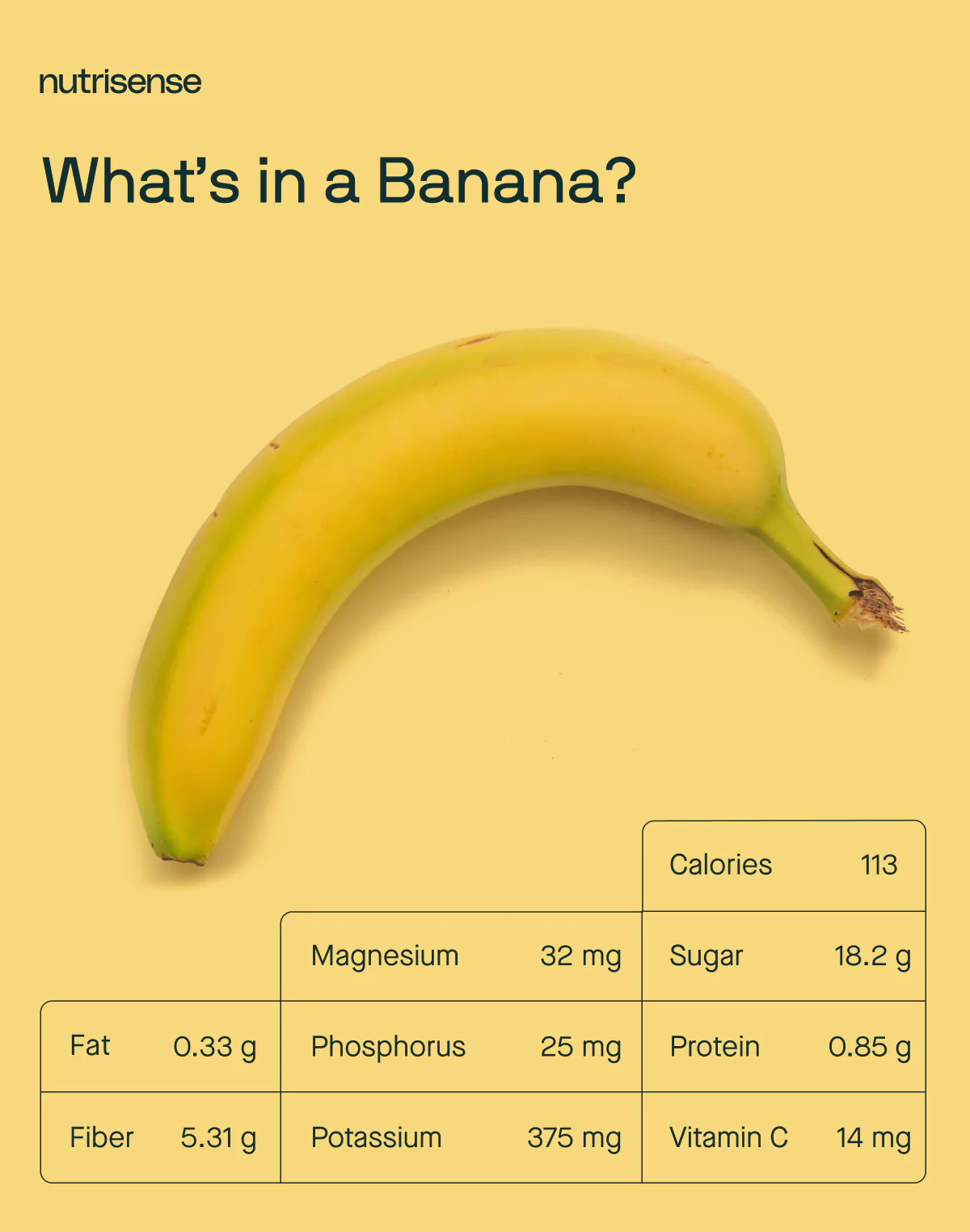
A typical medium-sized ripe ripe banana contains:
- 0.33 grams of fat
- 5.31 grams of fiber
- 18.2 grams of sugar
- 0.85 grams of protein
- 113 calories
Bananas are also a good source of many different micronutrients, containing roughly:
- 32 milligrams of magnesium
- 25 milligrams of phosphorus
- 375 milligrams of potassium
- 14 milligrams of vitamin C
How Many Calories Are in a Banana?
A medium-size banana contains about 113 calories. This may be important to keep in mind if you’re on a weight loss journey, since you may be monitoring the number of calories you consume.
Are Bananas Good for Weight Loss?
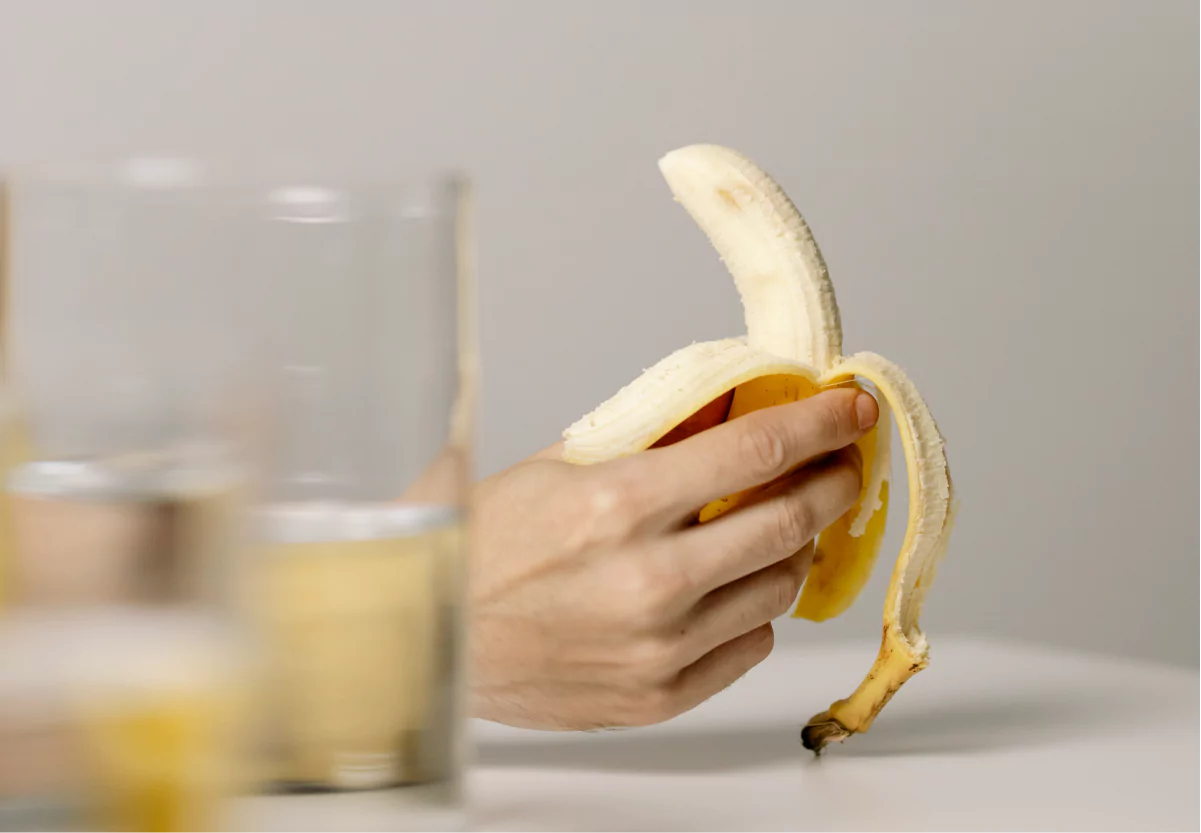
Yes, bananas can support weight loss. While they do not burn fat directly, they are a nutrient-dense fruit high in fiber, which helps improve satiety and regulate appetite. When eaten in moderation as part of a balanced diet, bananas can prevent overeating and support sustainable weight management.
As mentioned earlier, a single banana contains about five grams of fiber. The Dietary Guidelines for Americans suggest that adults get 14 grams of fiber per every 1,000 calories that they eat. So, if you eat 2,000 calories per day, one banana will provide you with about 18 percent of your daily fiber needs.
Research has shown that a diet high in fiber can have a beneficial effect on weight management. A high fiber intake is associated with less weight gain, improved feelings of satiety during and after meals, and delayed gastric emptying. This can help to reduce cravings and overeating.
High fiber diets have been shown to result in more weight loss than low-fiber diets. But remember, this relates to fiber consumption in general, not specifically fiber from bananas. Other fruits, vegetables, legumes, seeds/nuts, and whole grains can also be great sources of fiber.
When is the Best Time to Eat Bananas for Weight Loss?
The best time is typically in the morning or before a workout. Insulin sensitivity is often higher earlier in the day, meaning your body may process carbohydrates more efficiently. Additionally, the natural glucose in bananas provides a quick fuel source for exercise, helping to power your workout rather than being stored as fat.
How Do Bananas Affect Glucose Levels?
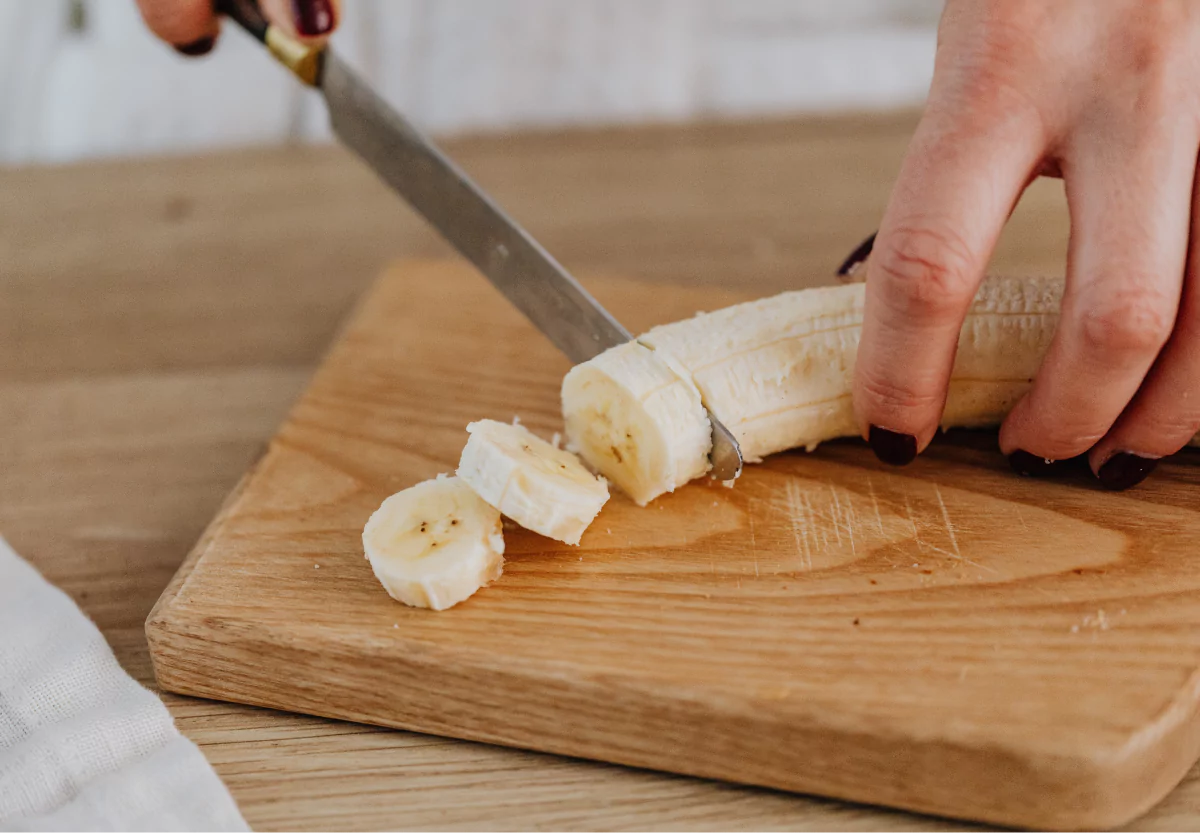
Bananas contain carbohydrates, which the body converts to glucose. However, the impact bananas may have on your glucose level depends on your unique metabolism, the banana's ripeness, and what you eat with it.
When eaten in small quantities, bananas are considered a low-glycemic index food. The glycemic index (GI) is a tool that can help you determine how quickly sugar from food will enter your bloodstream, causing a spike in blood sugar.
The GI of bananas ranges from 30 to 75, depending on the type (green bananas or ripe bananas), usually falling below 50. Bananas also have a low to moderate glycemic load, meaning that when eaten in small or regular portion sizes, they may have a low impact on blood sugar for most people.
However, your individual diet, and what foods you eat with a banana, should also be taken into account. For example, pairing a banana with a handful of nuts or nut butter or another protein source, for example, may help blunt any potential spike in glucose.
If you’re curious how bananas will affect your blood sugar, consult a dietitian or another trusted healthcare professional to determine if bananas are safe for you to eat.
5 Potential Health Benefits of Eating Bananas Regularly
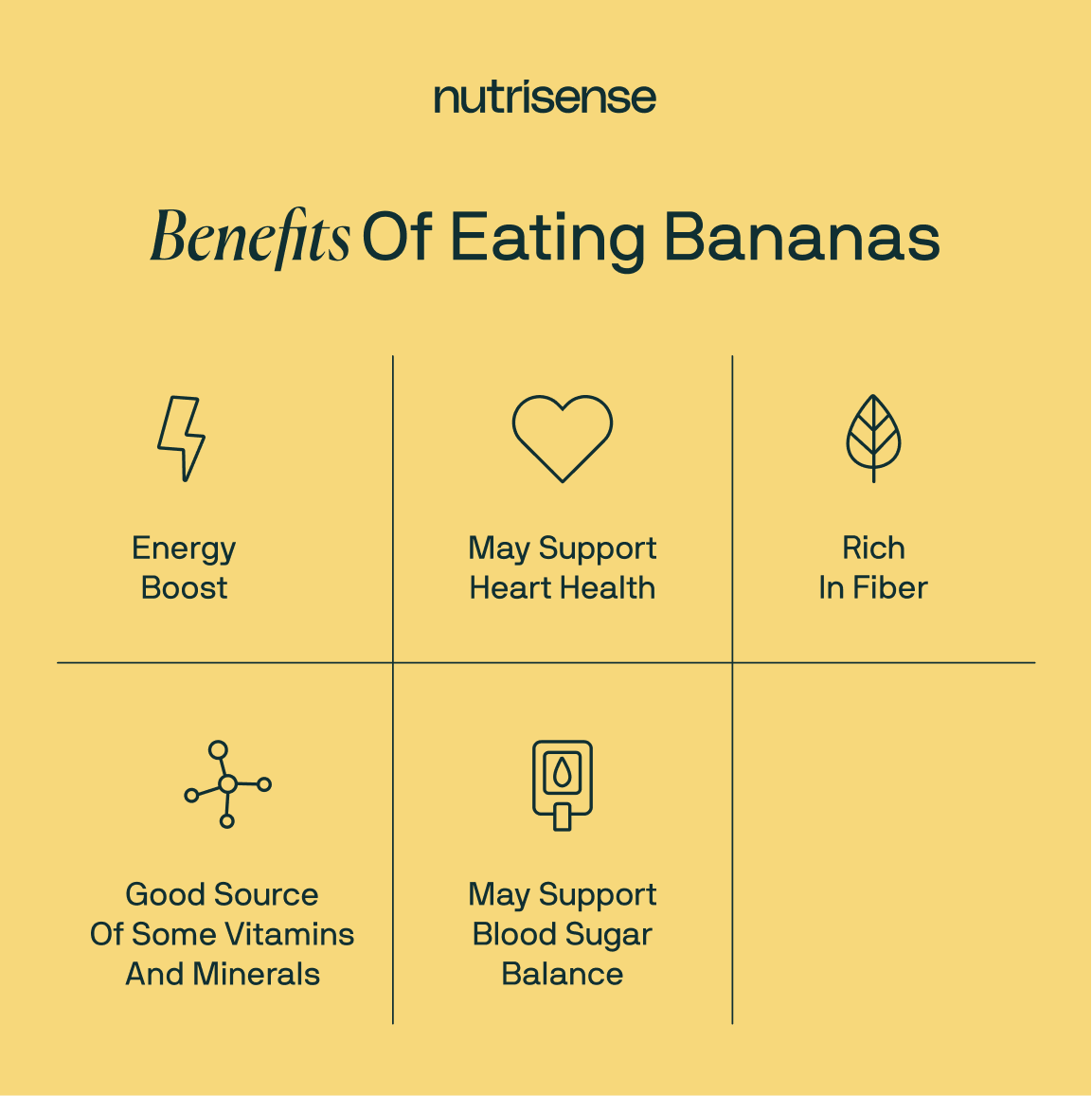
Bananas can be an enjoyable part of a healthy and nutritious diet plan. Here are some more potential health benefits of adding bananas to your diet:
1) Good Source of Some Vitamins and Minerals
As mentioned earlier, bananas are a highly nutritious fruit. Bananas are rich in vitamin C, which supports immune system function. They are also a good source of vitamin B6.
As most people know, bananas contain potassium, and they’re also a good source of magnesium, a mineral that is needed for muscle function, nerve function, managing blood sugar, and regulating blood pressure.
Phosphorus, a mineral present in bananas, is an important component of bones, teeth, RNA, and DNA. Bananas also contain some antioxidants, and are high in flavonoids and phenols.
2) Rich in Fiber
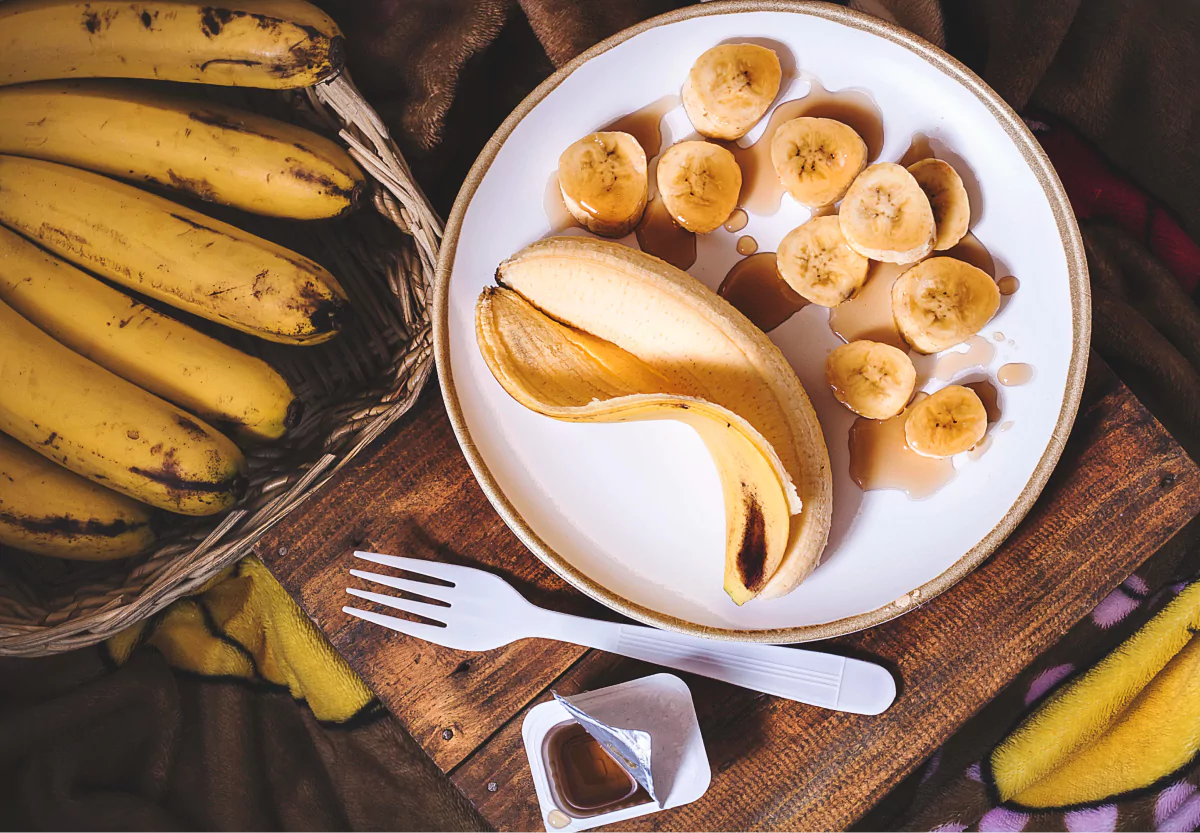
As mentioned, bananas have a high fiber content. Fiber is a carb that can’t be digested by the body. It stays mostly intact as it passes through your digestive system, which has the effect of bulking up your stool and making it easier to pass out of the body.
Adequate fiber may aid healthy digestion by decreasing constipation and lowering your risk of developing hemorrhoids, diverticular disease, and colorectal cancer. Bananas, and particularly unripe bananas, contain resistant starch, which works similarly to fiber.
Resistant fiber can reduce the risk of many gastrointestinal conditions, including colorectal cancer, ulcerative colitis, inflammatory bowel disease, diverticulitis, and constipation.
3) Energy Boost
All sugars are carbohydrates that the body converts into energy. Bananas are a good source of natural sugars, which are sugars that are found naturally in plant foods.
One 2012 study of male cyclists found that consuming bananas before cycling aided in performance and endurance just as much as a carbohydrate drink.
4) May Support Cardiovascular Health
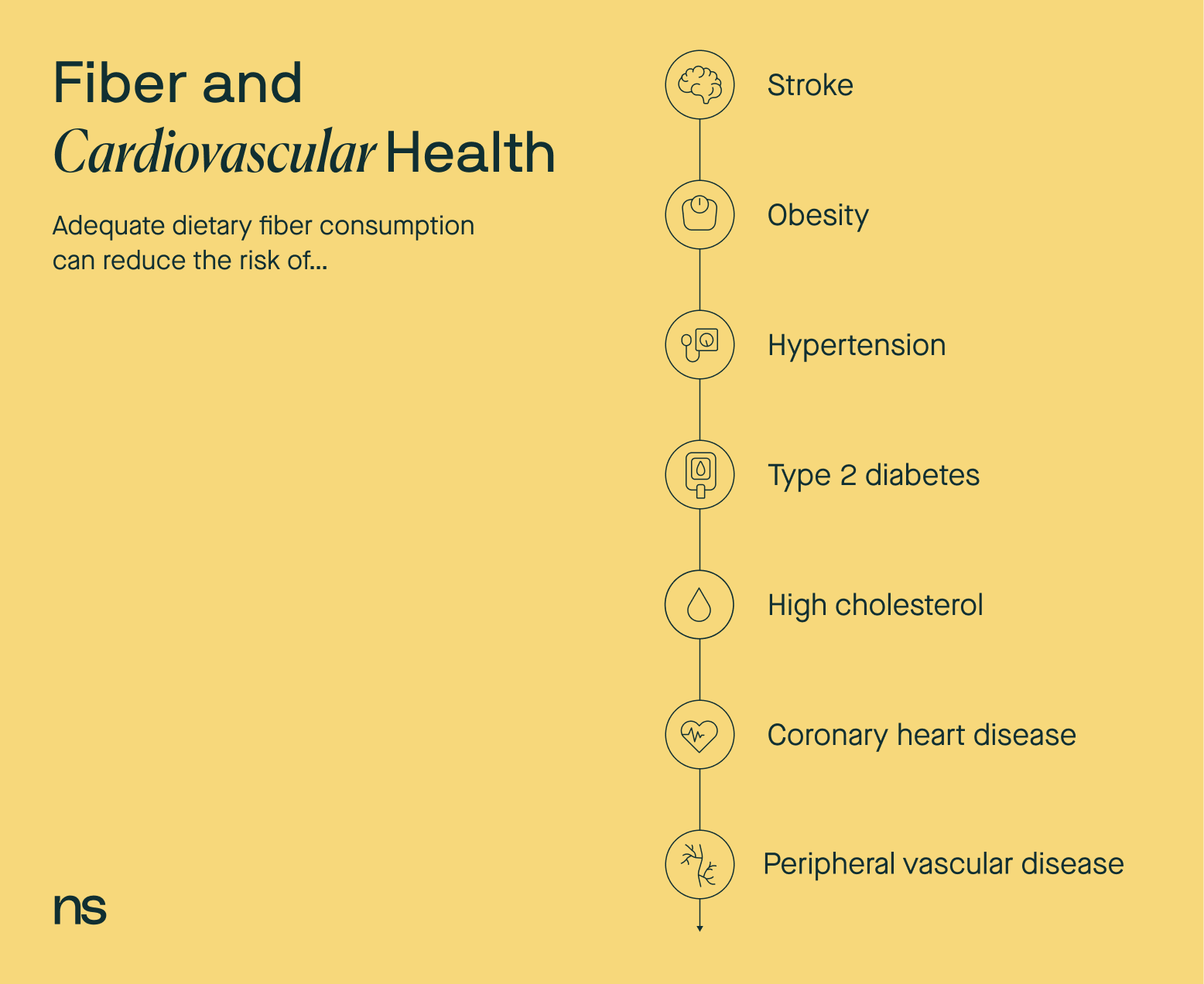
The nutrients in bananas may benefit heart health. Many different fiber-rich whole foods (not just bananas) may provide these protective effects. Adequate fiber from whole foods has been shown to reduce the risk of:
- Coronary heart disease
- Stroke
- Peripheral vascular disease
- Hypertension
- Type 2 diabetes
- Obesity
- High cholesterol
Bananas are also rich in potassium, a mineral that can help your body process sodium and blunt its negative effects. Sodium pulls water into your blood vessels, which increases the amount of blood flowing through them.
This can lead to high blood pressure, which can increase your risk of heart disease. Potassium not only helps get sodium out of the body, it also helps relax blood vessel walls, which can help lower blood pressure.
If you already have high blood pressure and take an ACE-inhibitor, the extra potassium in bananas may lead to a dangerously high potassium level in the body. If you take ACE-inhibitors, talk to your doctor before eating bananas.
5) May Support Blood Sugar Balance
The fiber and resistant starch content in unripe bananas may have a positive impact on regulating blood sugar. Resistant starch has been shown to improve glycemic efficiency, stabilize postprandial glucose, and improve fasting insulin sensitivity in adults with an increased risk of type 2 diabetes.
An increased fiber intake has also been shown to improve postprandial glycemia, increase insulin sensitivity, and improve glycemic control. But don’t forget to pair your banana with some protein for the best chance at balancing your glucose response!
How Many Bananas Can You Eat a Day for Weight Loss?
For most people, eating one medium banana per day fits well into a weight loss plan. However, individual carbohydrate tolerance varies. Pay attention to your body's cues: if you experience an energy dip or renewed hunger shortly after eating one, consider reducing the portion size or pairing it with protein.
How Does Ripeness Affect Nutritional Value?
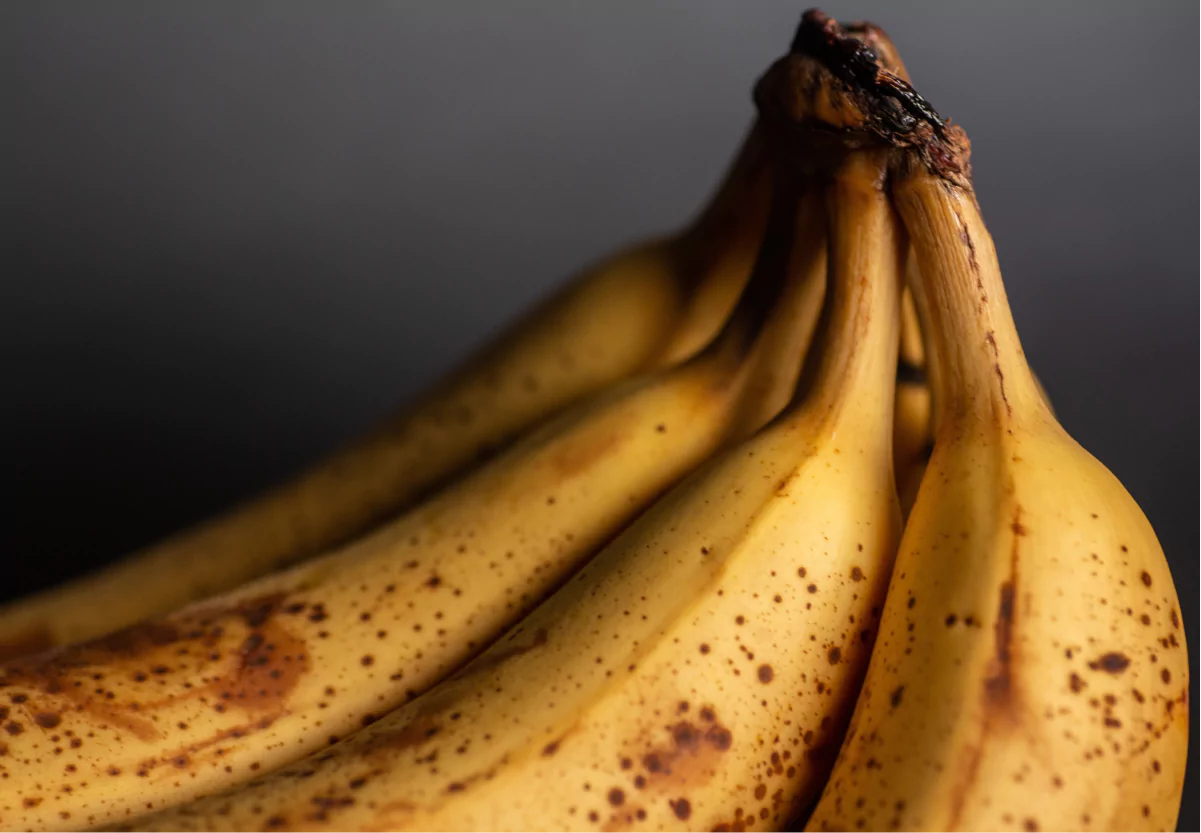
Interestingly, the ripeness of a banana can indeed affect its nutritional value. This is because as a banana ripens, its sugar levels increase and its fiber and starch levels decrease.
So, an unripe banana contains more fiber and resistant starch than ripe bananas, as well as less sugar.
Pro Tip: If your goal is weight loss, opt for greener bananas. The resistant starch acts like a prebiotic, supporting gut health and leading to a lower glucose response compared to fully ripe, spotted bananas.
Find the right Nutrisense programto turn insight into progress.
Frequently Asked Questions
Q1. Do bananas cause belly fat?
A1. No. No single food targets belly fat. Weight gain results from a consistent caloric surplus. Bananas are unlikely to contribute to visceral fat when eaten as part of a balanced nutrition plan.
Q2. Do bananas boost metabolism?
A2. While no food magically "boosts" metabolism, bananas are a good source of potassium and magnesium, which support muscle function. Building and maintaining lean muscle is key to a healthy metabolic rate.
Go Beyond Glucose Data with Nutrisense
Your glucose can significantly impact how your body feels and functions. That’s why stable levels are an important factor in supporting overall wellbeing. But viewing glucose isn't enough. Nutrisense, you’ll be able to learn how to use your body's data to make informed lifestyle choices that support healthy living.
One-to-one coaching
Sign up to access insurance-covered video calls to work with a glucose expert: a personal registered dietitian or certified nutritionist who will help tailor your lifestyle and diet to your goals.
Monitor and measure what matters
With the Nutrisense CGM Program, you can monitor your glucose with health tech like glucose biosensors and continuous glucose monitor (CGM)s, and analyze the trends over time with the Nutrisense App. This will help you make the most informed choices about the foods you consume and their impact on your health.
Find your best fit
Ready to take the first step? Start with our quiz to find the right Nutrisense program to help you take control.

Heather is a Registered and Licensed Dietitian Nutritionist (RDN, LDN), subject matter expert, and technical writer, with a master's degree in nutrition science from Bastyr University. She has a specialty in neuroendocrinology and has been working in the field of nutrition—including nutrition research, education, medical writing, and clinical integrative and functional nutrition—for over 15 years.




